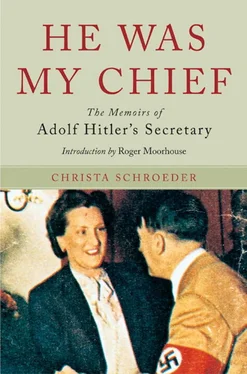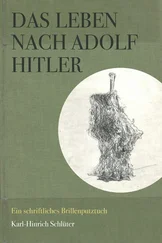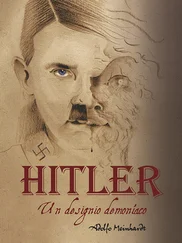Christa Schroeder - He Was My Chief - The Memoirs of Adolf Hitler's Secretary
Здесь есть возможность читать онлайн «Christa Schroeder - He Was My Chief - The Memoirs of Adolf Hitler's Secretary» весь текст электронной книги совершенно бесплатно (целиком полную версию без сокращений). В некоторых случаях можно слушать аудио, скачать через торрент в формате fb2 и присутствует краткое содержание. Город: Barnsley, Год выпуска: 2012, ISBN: 2012, Издательство: Frontline Books, Жанр: История, Биографии и Мемуары, на английском языке. Описание произведения, (предисловие) а так же отзывы посетителей доступны на портале библиотеки ЛибКат.
- Название:He Was My Chief: The Memoirs of Adolf Hitler's Secretary
- Автор:
- Издательство:Frontline Books
- Жанр:
- Год:2012
- Город:Barnsley
- ISBN:978-1-7830-3064-4
- Рейтинг книги:4 / 5. Голосов: 1
-
Избранное:Добавить в избранное
- Отзывы:
-
Ваша оценка:
- 80
- 1
- 2
- 3
- 4
- 5
He Was My Chief: The Memoirs of Adolf Hitler's Secretary: краткое содержание, описание и аннотация
Предлагаем к чтению аннотацию, описание, краткое содержание или предисловие (зависит от того, что написал сам автор книги «He Was My Chief: The Memoirs of Adolf Hitler's Secretary»). Если вы не нашли необходимую информацию о книге — напишите в комментариях, мы постараемся отыскать её.
He Was My Chief: The Memoirs of Adolf Hitler's Secretary — читать онлайн бесплатно полную книгу (весь текст) целиком
Ниже представлен текст книги, разбитый по страницам. Система сохранения места последней прочитанной страницы, позволяет с удобством читать онлайн бесплатно книгу «He Was My Chief: The Memoirs of Adolf Hitler's Secretary», без необходимости каждый раз заново искать на чём Вы остановились. Поставьте закладку, и сможете в любой момент перейти на страницу, на которой закончили чтение.
Интервал:
Закладка:
Christa Schroeder
HE WAS MY CHIEF
THE MEMOIRS OF ADOLF HITLER’S SECRETARY

Introduction
CHRISTA SCHROEDER WAS AN ordinary woman cast into quite extraordinary times. Born in 1908 in the pretty central German town of Hannoversch Münden, she trained as a stenotypist before moving to Munich in 1930. Whilst there, she replied to an advertisement in the newspaper for a secretarial position at the headquarters of Hitler’s stormtroopers◦– the SA. The association thus forged would be a lasting one. Graduating to a position as Hitler’s personal secretary in 1933, Schroeder would be part of the Führer’s entourage for the following twelve years, right up the bitter end in 1945.
This memoir, compiled from contemporary notes and letters as well as postwar reminiscences, is Christa Schroeder’s own record of those extraordinary times. It gives the reader a fascinating insider’s viewpoint on many of the salient events of the Third Reich. She expounds not only on political developments such as the Röhm Purge of 1934 or the attempt on Hitler’s life in July 1944, but also on military matters from the Polish campaign through to the final collapse of the Nazi regime, which she experienced from the comparative safety of Berchtesgaden.
Yet it is not primarily for her political insights that Schroeder is of interest. Her experiences certainly ranged widely, but there is a backbone to her book which is not concerned with grand politics◦– a subject about which she claimed to have little knowledge or understanding◦– rather it gives an intimate view of the workings of Hitler’s household and of the various characters working therein. In this regard, there is a refreshingly gossipy, chatty flavour to the book, as it illuminates some of the foibles and idiosyncrasies of members of Hitler’s entourage, as well as addressing more substantial themes such as Hitler’s often difficult and mysterious relationships with women.
Hitler looms large in the book, of course. As secretary to the Führer throughout the Third Reich, Schroeder knew Hitler as well as anyone and was extremely well placed to comment on his behaviour and personality. Indeed, Schroeder was herself no shrinking violet, and often spoke rather too bluntly to her employer. In the winter of 1944, for instance, she asked Hitler to his face if he still believed that the war could be won. Indeed, it seems that her candour almost became her undoing when she was ostracised by Hitler for a number of months after making the mistake of publicly contradicting him once too often. Yet, for all that, Schroeder’s is nonetheless a not unaffectionate portrait. Indeed, her presentation of the leader of the Third Reich as a rounded, three-dimensional, human being◦– with likes and dislikes, hopes and fears◦– is fascinating. She details his bourgeois manners, his vehement abstemiousness, his mood swings, even his sense of humour. Her description of Hitler is not of the wide-eyed fanatic, so familiar to the modern reader; rather he appears as a generous◦– even avuncular◦– benefactor, a kisser of ladies’ hands; a man who chatted easily with his secretaries and had a passion for Bavarian apple cake.
For all its gossipy revelations, however, there is a dark side to Schroeder’s story. For one thing, the ‘tone’ of her book is utterly unapologetic; there is nothing, for example, of the sense of perspective or mea culpa that one finds in the memoirs of Hitler’s other secretary, Traudl Junge◦– who famously concluded that ‘we should have known’ about the horrors of the Third Reich. This lack of remorse is, in part, a consequence of Schroeder’s rather cantankerous character: even the editor of this volume, Anton Joachimsthaler, described her as ‘tough’, ‘extremely critical’ and even ‘wounding’ in her ways.
Yet there is more to it than that. Schroeder claimed◦– convincingly, I think◦– to have known nothing of the horrors of the Nazi regime and of the crimes being committed in Germany’s name. One might legitimately ask how a secretary in the Reich Chancellery could have long remained ignorant of the Holocaust. Yet, for all her closeness to the epicentre of power in Hitler’s Germany, Schroeder would have argued that hers was a rather mechanical task largely restricted to the typing up of speeches and mundane daily correspondence, in which such events were rarely mentioned, or else couched in an impenetrable fog of euphemisms and double-speak. The most sensitive of instructions, of course, would always have been transmitted in person, thereby leaving little or no ‘paper trail’. Moreover, Schroeder was if anything too close to Hitler and the Nazi elite◦– too close to gain an objective view, too close to question the propaganda, too close perhaps to catch a glimpse of the ugly truth. Confined in the rarefied atmosphere of Hitler’s ‘court’◦– in the eye of the Nazi storm◦– Schroeder was effectively insulated from the grim realities of the world outside.
As the logical corollary to this ignorance, Schroeder found it difficult to imagine that she personally had done anything reprehensible. Nonetheless, classified by the Americans as a war criminal of the first order, she was interned for three years after 1945. This treatment evidently rankled. As she complains in this book: ‘Whether my guilt was as great as my expiation is something I do not know to this day.’
There were further grounds for her bitterness. After the war, she was interrogated at length by Frenchman Albert Zoller, who was serving as a liaison officer with the US Seventh Army. Zoller typed up and embellished his interrogation notes and published them under his own name as Hitler Privat , in 1949, describing the work as the memoir of Hitler’s ‘secret secretary’, but with Schroeder receiving no credit and, of course, no royalty. She would later complain that Zoller had also taken many of the material mementoes◦– Hitler’s sketches etc.◦– that she had been given or had rescued from the ruins of the Third Reich. But, what rankled most perhaps, was that she claimed that he had also appended her name to various comments, opinions and anecdotes that she had never given.
Christa Schroeder’s memoir was published, in German, soon after her death, aged seventy-six, in 1985. Understandably perhaps, given the injustice that she clearly felt, the book had a hint of obsession about it. She waxed bitterly lyrical about Zoller’s perfidy, and appended lists of errors and statements that, she said, had been falsely attributed to her. As a self-confessed ‘fanatic for truth’, it seems, she was desperate to set the record straight, to put an end to what she perceived as her exploitation and misrepresentation by a generation of historians and writers.
Despite being a critical and commercial success, however, Schroeder’s book did not find an English language edition until the present volume, over two decades later. This is peculiar; especially if one bears in mind the reception accorded to the memoir of Hitler’s other secretary◦– Traudl Junge’s Until the Final Hour ◦– which was published to great acclaim in 2002. It may have something to do with Schroeder’s rather prickly and unrepentant nature, and with the precise instructions that she left regarding how the memoir was to be prepared and published. It may also be that such personal testimony was simply out of favour in the mid 1980s. History, at that time, was at the height of its postmodernist spasm and was perhaps too busy finding obscure new perspectives and spurious grand narratives to bother too much with the simple memoirs of a simple secretary.
Читать дальшеИнтервал:
Закладка:
Похожие книги на «He Was My Chief: The Memoirs of Adolf Hitler's Secretary»
Представляем Вашему вниманию похожие книги на «He Was My Chief: The Memoirs of Adolf Hitler's Secretary» списком для выбора. Мы отобрали схожую по названию и смыслу литературу в надежде предоставить читателям больше вариантов отыскать новые, интересные, ещё непрочитанные произведения.
Обсуждение, отзывы о книге «He Was My Chief: The Memoirs of Adolf Hitler's Secretary» и просто собственные мнения читателей. Оставьте ваши комментарии, напишите, что Вы думаете о произведении, его смысле или главных героях. Укажите что конкретно понравилось, а что нет, и почему Вы так считаете.












